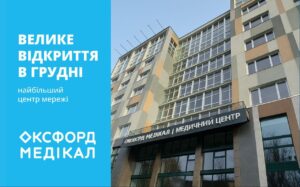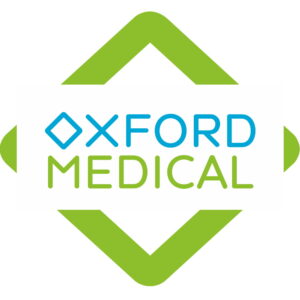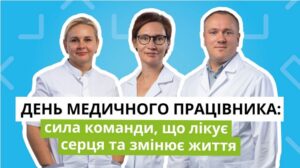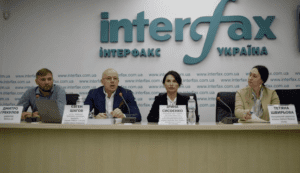
The Oxford Medical network of private medical centers celebrates its 20th anniversary and continues to work to provide continuous healthcare for Ukrainians. One of the incredible gifts will be the opening of the largest full-cycle medical center in the network at 7a Parkovo-Syretska Street, Kyiv, which will take place in December!
The first services to be available will include:
– Outpatient care in all areas: therapy, pediatrics, cardiology, gynecology, urology, dermatology, gastroenterology, neurology, aesthetic medicine, and others;
– Modern diagnostics: CT, MRI, mammography, X-ray, ultrasound (including 3D/4D), endoscopy, and laboratory tests.
Other departments will be opened in the future, including: a surgical department and inpatient ward, intensive care unit, therapeutic inpatient ward, pediatric department with inpatient ward, infectious diseases department, and others.
Oxford Medical is constantly improving. Our doctors regularly undergo training at leading European clinics, participate in international conferences, and implement modern diagnostic and treatment protocols.
We use only equipment from world leaders, which guarantees the accuracy and safety of procedures.
Emergency assistance with travel to any area of Kyiv or its suburbs arrives within 30-60 minutes, and appointments can be made online at https://oxford-med.com.ua/ and by calling +38 (044) 204 40 40.
We work – we heal!

Digitalization is becoming a key driver of private medicine development in Ukraine, with online appointment, electronic medical histories, telemedicine consultations and automatic reminders forming a “new culture of care”, Oxford Medical claims.
“Today’s patient wants to get a consultation quickly and conveniently. Online appointment in two clicks, test results in an app, personalized treatment plans – this is the standard without which private medicine no longer exists,” said Angelina Moroz, medical director of the Kiev branch.
The company also introduces personalized support: administrators and managers act as guides for patients, and doctors remain involved at all stages – from diagnosis to postoperative follow-up.
Oxford Medical – a network of clinics, founded in 2005, covers dozens of cities in Ukraine. Hundreds of specialists work in the staff. The company relies on digitalization, telemedicine and integration with the NHS, developing standards of quality service and focusing on the needs of patients.

The private medicine market in Ukraine continues to show growth despite the war and economic challenges. According to experts, the private sector is increasingly competing with state institutions, forming new standards of quality and service.
“We see that Ukrainians have started to invest more in health. If in the 2000s private medicine was perceived as an addition to state hospitals, now it is a full-fledged alternative”, – said the director of Oxford Medical network Tetyana Sidorova.
According to Pro-Consulting, before the war, the share of private medicine was about 10-15%. However, the COVID-19 pandemic and then military conditions accelerated the transformation. The development of telemedicine, the expansion of networks in bedroom communities and the emergence of highly specialized areas were key factors in strengthening the market position.
Oxford Medical is the largest network of multidisciplinary medical centers in Ukraine, founded in 2005. The network unites dozens of branches in different regions, providing a full range of medical services: from outpatient appointments and laboratory diagnostics to surgery, dentistry and inpatient care.

Medical professionals are extraordinary people because their profession is, above all, a calling that requires tremendous inner strength, endurance, and faith, often physical as well. This is especially true in times of war. On Medical Workers’ Day, we want to share the stories of Oxford Medical doctors, because we felt true courage and humanity in their words. These stories have become a symbol of the resilience of a large family — the largest private medical network in Ukraine.
Everyone who works with patients literally holds the front line of the nation’s health, helping Ukrainians in their most difficult moments, including:
And no matter what their specialty is, more and more often, medical professionals, in addition to their direct duties, are performing a mission that is so necessary right now — providing emotional and psychological support to people.
“If I see that a patient’s problem is not with their heart, but is caused by general stress or chronic fatigue, I will still comfort them and provide psychological support, because words penetrate the soul and ultimately heal,” says cardiologist Natalia Bakhyan.
Right now, it’s tough for everyone, so the doctor thinks that medical workers should stick together and support each other, share their experiences, and give practical advice so they don’t burn out and have the resources to keep treating people.
For its part, the management of Oxford Medical notes that it feels a great responsibility, because the largest private medical network in Ukraine must not only care for patients, but also support those who save lives every day.
“In addition to our main task of providing Ukrainians with access to quality medical care, which requires a team of highly qualified specialists, state-of-the-art equipment, innovative technologies, and high-quality service, we must take care of our employees by creating comfortable working conditions, promoting their professional development, and advancing their careers. And we must provide jobs, especially to medical professionals who have lost the most precious things in their lives — their homeland, their homes, their families, and their medical practices,” says Tetyana Sydorova, director of Oxford Medical clinics in Kyiv.
Oleksandr had everything in Mariupol — respect, achievements, and a high position: he was the medical director of a private clinic. But with the start of the full-scale war, he had to leave his homeland.
“I left the city while it was under siege in April 2022. The humanitarian corridors weren’t working, so I left under fire, taking detours. First, I got to Zaporizhzhia, then Poltava. There, I decided to seek my fortune in the capital. At the end of April, I had an interview at Oxford and have been building a new life ever since,” the doctor recounts.
Part of his family left the country, but Oleksandr made an important decision to stay: “I want to make the most of my knowledge and skills to provide medical care in Ukraine. Oxford Medical welcomed me into their family with open arms. And when I faced serious personal problems, the entire team came to my aid.”
From a gastroenterologist, Oleksandr rose to become the head of a structural unit, and now he is responsible for three units in the network and thousands of patients in Kyiv.
On February 22, Anastasia and her family left for her parents’ home in the Kherson region and found themselves under occupation just a week later. The family lived without electricity, water, or gas for two months. To escape the occupation, the Ivashchenkos had to walk 12 km to the administrative border of the Dnipropetrovsk region. They eventually settled in Kyiv.
“Leaving my parents and my hometown was extremely painful. The capital greeted us with cold weather, rain, and rockets hitting the Artem factory,” recalls the medic.
At first, Anastasia worked as a “doctor without borders,” traveling around the Kyiv region during blackouts. Then she was invited to work at Oxford Medical: “They took me without any questions, even though I was still working part-time in Kherson. Here I met colleagues who were also displaced persons — from Kherson, Bakhmut, Mariupol, Luhansk, and Donetsk regions. They were kindred spirits because they had gone through the same thing as me.”
Ms. Ivashchenko still maintains close ties with doctors from Kherson and does not abandon her fellow patients in need: “My nurse now lives in Germany. As a reminder of our friendship, I wear a gift she gave me — a brooch in the shape of a phonendoscope. And patients from Kherson still call me for help. I never turn anyone away, even if they don’t have a contract with me. I still give them consultations and advice free of charge.“
Marina worked as the head of a dermatology and venereology clinic in Bakhmut for 20 years. As a leading specialist who knew her job and could solve any problem, she was valued not only in the city but throughout the Bakhmut district.
However, due to the war, in April 2022, the doctor and her family found themselves in Kyiv. A friend offered her a job at Oxford: “It so happened that I visited the clinic on Wednesday just to get acquainted, and on Thursday I already started working! They welcomed me warmly, helped me quickly integrate into the team and get used to the new structure.“
The doctor admits: ”I fell in love with Oxford with all my heart, and I hope it’s mutual, because the company has given me a lot of trust: after a while, I was offered a similar position — head of department. So, since the fall of 2023, I have been heading a large dermatology and cosmetology department in Podil.”
Marina likes the atmosphere of the network: the attitude of the management and the friendly relations with her colleagues. And she emphasizes another big plus — Oxford always promotes the development of its employees: seminars, lectures, conferences, training — the desire for self-improvement is welcomed here.
“Right now, I am specializing in surgical dermatology. Yes, I work and study a lot, come home late at night, go on business trips — on the one hand, it’s hard, but on the other, it’s inspiring. What’s more, at Oxford, they listen to us! When I became head of the department and we started to actively develop it, the company purchased modern equipment and organized training based on our recommendations. We are trying to create something new, a new space — and the management is very supportive of this,” says the doctor.
Marina has been asked many times why she did not leave the country, since with her specialty she could have found a job anywhere. But in a family of doctors, this option was not even considered: her husband is a dermatologist working in a military hospital, and their children and parents remain in the capital: “We love Ukraine very much and want to live on our land. We hope that at least someday we will be able to see our native Bakhmut. But I am extremely grateful that Kyiv has welcomed us so warmly. It’s as if it was waiting for us to start working here fruitfully. And we have succeeded because we are not standing still, but moving forward. I am proud that at this age, my husband and I are trying to do something meaningful for medicine and for our people.“
Before moving to Kyiv and working at Oxford, Natalia worked for nine years as the head of the cardiology department in Toretsk, where she had the highest category and status of leading cardiologist. However, the decision to leave Donbas had been brewing since 2021, because her city had been in the war zone since 2014 and was constantly under shelling.
With the outbreak of full-scale war, the cardiologist had to move again: she and her family found refuge in Poltava for a while, but she continued to provide medical assistance there: “When we were all scattered across different regions, Oxford came up with a great initiative: to call our patients to find out how they were doing and at least remotely advise them on medications and how to act in emergency situations.”
Sometimes, the doctor would call people sitting in basements in Irpin or Bucha. Some people were feeling ill, so she had to tell them what pills to take, what to use as a sedative, how to lower their blood pressure or calm their arrhythmia: “Everyone thanked us for our support, even if it was from a distance, but it was important to them. And for us too, because we felt needed.“
Since 2014, Dmytro has been providing assistance to the wounded in the east as part of volunteer formations.
From the first day of the full-scale invasion, as the chief medical officer of the “Hospitaliers” battalion, he led the evacuation of the wounded in the Kyiv region and assisted the Defense Forces. After the situation in the capital stabilized, he performed his duties as a medic in the hottest areas — in Bakhmut and Vuhledar. He later joined the 59th Mobile Hospital of the Armed Forces of Ukraine and worked as a vascular surgeon in the Donetsk region.
For three years now, Dmytro has been saving the lives of his comrades and civilians in a field hospital in one of the most dangerous areas. Even on the front line, he makes every effort to advise patients in need of help.
Whenever he has days off, the doctor finds time to visit his native Oxford Medical in Podil to perform surgery or consult as a vascular surgeon.
“It is important not only to save the patient, but also to give them the opportunity to return to a full life. This is our duty and our respect for the soldiers,” he says.
“Every day, we contribute to the fight against cancer. At the same time, we need to keep our hearts warm and our heads cool so that we don’t burn out and so that past experiences and cases don’t have a negative effect in the future,” the doctor concludes.
We have given just a few examples of how strong our doctors are. So let’s be proud of everyone who saves lives, supports patients, and holds the medical front line day after day.
“Thank you to our team for their dedication and care. Thank you to our patients for their trust. Together, we are a force that heals,“ says the management of the Oxford Medical network.
Cardiologist Natalia Bakhyan explains why the work of doctors is so difficult and exhausting: ”We chose this profession and live it constantly. Even when we close our office and shut down our programs, our thoughts still return to our patients: did I do the right thing, did I understand the situation correctly, did I calculate the dosage correctly, did I choose the right medication? And this work never ends. I may not remember a patient’s name, but I will always remember the diagnosis they came to me with.”
Let’s thank the medical professionals today — the people who selflessly care for our health and lives. They need our words of support now more than ever.

Experts representing private and public clinics and related businesses have teamed up to develop and launch a program to develop preventive medicine and support the health of Ukrainians in wartime.
As the head of the Health Support Program and GAMA CONSULTING, Adviser of the Russian National Institute for Preventive Medicine Yevhen Shagov said at a press conference in Kyiv, the need to develop the program is caused, in particular, by the needs of wartime medicine. The press conference was attended by experts from Kundiiev Institute of Occupational Health of the National Academy of Medical Sciences of Ukraine, the Oxford Medical clinic (Kyiv), Biotus.ua and the medical online hub DOC.UA, which are members of the initiative working group, which activities are aimed at the development of preventive medicine in Ukraine.
“Education and medicine are under the pressure of martial law and Russian aggression, and this cannot but have consequences. The education system has managed to transform during the pandemic, in healthcare we need to take this experience into account. We already see that war and chronic stress have an extremely negative impact on various aspects of health. All this is happening amid declining wealth of Ukrainians and the fact that a significant part of Ukrainians are abroad, where they often have a language barrier and lack high-quality health insurance to effectively take care of their health,” he said.
According to Shahov, chronic acute stress that a person faces in a war leads to an imbalance in the endocrine system, which causes emotional and physical burnout, decreased performance, and sleep disturbance. Moreover, stress is the cause of immune suppression, exacerbation of chronic diseases, the development of a number of new pathologies, up to oncological diseases. According to Shahov, this can be prevented by an effective and accessible system of preventive medicine: “There is no way to cancel stress, but it is possible to increase the stress resistance of Ukrainians.”
He noted that the goal of the program was to develop an effective “health basket,” which will include, among other things, personally selected vitamins and microelements. Monitoring the health status of patients, taking medications, adjusting all components of the prevention program can be carried out using online tools and distance medicine.
According to Shahov, the development of the program and the “health basket” began even before the war, its creation was announced in 2020 by President Volodymyr Zelensky. At present, its authors have already accumulated a sufficient amount of information about its positive impact on health.
The world’s leading experts in Anti-Age Medicine, Age Management, specialists from private and public medical institutions of our country took part in the work on the program.
According to Deputy Director of Kundiiev Institute of Occupational Health of the National Academy of Medical Sciences of Ukraine Iryna Sysoyenko, the issue of including preventive medicine in the general healthcare system is currently very relevant.
“In the conditions of martial law and the emergency load on the healthcare system, it is especially important to prevent the occurrence of diseases in time. Timely diagnosis allows us to detect the accumulation of heavy metals and harmful substances in the body, and preventive measures will prevent serious diseases in the future,” she said.
Sysoyenko noted that the institute, in particular, has toxicological laboratories and can clearly determine the presence of harmful substances in the human body.
In turn, General Director of the Oxford Medical clinic (Kyiv) Tetiana Shvyriova emphasized that with the start of military aggression, people began to seek medical help not only in urgent and emergency conditions, but also in a state of stress, psychological instability and “misunderstanding what they have to do with their chronic diseases.”
“Some people were cut off from doctors, from pharmacies, but they had to continue to be observed and receive consultations about their health. We see what months of lack of opportunity for people to receive qualified help amid acute stress lead to,” she said.
According to Director of Biotus.ua Dmytro Hrekulov, his company plans to expand the already existing production of Ukrainian vitamin drugs based on the recommendations developed by the project experts.
According to Olena Hrytsai, head of medical booking at DOC.UA, it will be possible to get recommendations and become a member of the program using the DOC.UA medical online hub platform.
“Now DOC.UA receives about 5 million requests from patients per month, and 40% of them are related to stress management, so the initiative is very relevant,” Hrytsai said.
biotusua, CONFERENCE, docua, Gama consulting, hrekulov, hrytsai, MEDICINE, OXFORD MEDICAL, preventive, shahov, shvyriova, сисоєнко